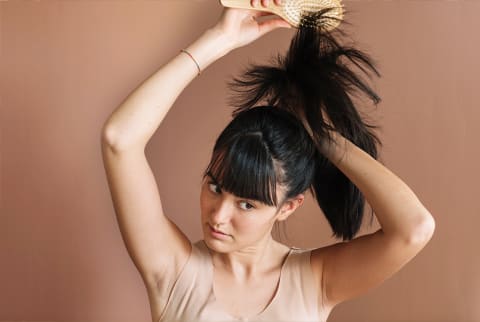Advertisement
Vitamin D vs. Biotin: Which Is Better For Hair Loss?


Hair growth starts internally, with happy, healthy follicles. You can slather on all the hydrating hair masks or scalp-stimulating serums you please, but if your body lacks essential nutrients, trust us, your mane will suffer.
It's why many beauty fans flock toward hair vitamins when dealing with increased shedding. Now, you can find quite a few formulations on the market—from collagen powders to mineral complexes to antioxidant-rich tonics—but one growing debate has recently caught our attention: Which is better for hair growth, vitamin D or biotin?
Ahead, find our investigation.
Vitamin D for hair
Vitamin D is essential for pretty much every bodily function—including, yep, your hair growth. In fact, insufficient levels of vitamin D1 have been linked to hair shedding. Considering clinical vitamin D insufficiency persists in almost half of the population (41%2, to be exact), it may be something to consider if you're dealing with hair loss.
"Vitamin D3 directly interacts with hair follicles, and when D3 levels aren't optimal, it can decrease the volume of hair on the scalp and throughout the body," certified trichologist and founder of Advanced Trichology William Gaunitz, FWTS, previously told mbg about vitamins for hair growth.
That said, it's important to promote and maintain healthy vitamin D levels, which is practically impossible to do with food and sunshine alone. To reach optimal vitamin D status, experts recommend vitamin D supplements, ideally one with an efficacious dose (5,000 IU) and built-in fats to enhance absorption. Sounds like a tall order, so we compiled this handy list of vitamin D supplements that fit the bill.
Biotin for hair
Biotin is perhaps the more well-known player, as it's involved in keratin production3. Research even shows that not getting enough biotin4 can lead to breakage and hair shedding—however, true biotin deficiencies are quite rare.
Still, your body cannot make its own biotin, so you must ingest it orally. Meat (especially organ meat), fish, eggs, seeds, nuts, and certain vegetables (sweet potatoes, broccoli, and spinach) are top food sources of biotin, while targeted supplements can also provide support.
For optimal hair benefits, you might even consider a biotin supplement with complementary nutrients, like vitamin D or collagen. We already discussed the importance of the former, but collagen also contains amino acids that are necessary for keratin production and, therefore, hair growth. That's why you can find some hair growth supplements that have both biotin and collagen—like a few noteworthy options in this list here.
Which is better?
Our take: Why not combine them? As we mentioned, biotin works well with complementary nutrients, and vitamin D supports plenty of other functions of your body besides hair growth. Chances are, you'll benefit from getting more vitamin D, anyway.
If you would rather choose a single route, it's ultimately up to personal preferences and lifestyle considerations. For example, some people who have gut concerns can find it challenging to support healthy levels of biotin5 and may want to pay special attention to their levels.
As always, it's best to chat with a doctor before starting any new supplement routine—they can help you choose the right regimen based on your health history and personal goals.
The takeaway
Both vitamin D and biotin can support healthy hair. Just know that neither nutrient will completely transform your locks overnight; we recommend using hair vitamins as one part of a larger, holistic hair routine—ideally one that also includes healthy hair growth serums, shampoos, and various products.











